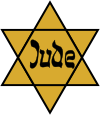Anti-Komintern
Anti-Comintern was a special agency within the Propaganda Ministry under Joseph Goebbels in Nazi Germany charged with administering anti-Soviet propaganda campaign in the mid-nineteen thirties. One of its main activities was to publicize that "Bolshevism was Jewish."[1]
The Soviet Union in Anti-Comintern publications
Propaganda is made to serve an immediate purpose. The books published by Nibelungen Verlag between 1935 and 1941 were all designed to establish a Feindbild (an image of the enemy or bogeyman) of Bolshevism. These tests become interesting when placed in the context of the history of propaganda and German- Russian relations. They provide evidence of the discursive entanglements between National socialist in Germany and the USSR, demonstrate what one regime wrote about the other, and show how the propaganda methods and narratives of one side influenced the other. The narrative of the travelogue and the setup of the Anti- Komintern as an association clearly point to Soviet examples.
"Jewish Bolshevism" and “Jewish World Conspiracy”
Between the summer of 1939 and the spring of 1941, when the Third Reich and the USSR were allied, the anti-Bolshevik propaganda was halted. Joseph Goebbels officially dissolved the Anti-Comintern and concentrated the efforts of his ministry on the British enemy. This had to change with the German aggression against the USSR. After the attack on the Soviet Union on 22 June 1941, Goebbels noted in his diary that it was time to play the “anti-Bolshevik record” once again. The propaganda ministry had to rally the concerned German public for the war against the USSR. It soon became apparent that the wartime propaganda was more than a mere repeat of the anti-Soviet campaign of the late 1930s. Nazi Germany propaganda again emphasized the global Jewish conspiracy against the Germanation, as the anti-Bolshevik rhetoric became a part of a discourse that served to legitimize the World War and the Holocaust.
Literature
- Walter Laqueur: Anti-Komintern, in: Survey – A Journal of Soviet and East European Studies, No. 48, July 1963, pp. 145–162
See also
References
- Waddington, Lorna L. (2007). "The Anti-Komintern and Nazi Anti-Bolshevik Propaganda in the 1930s". Journal of Contemporary History. 42 (4): 573–594. doi:10.1177/0022009407081488. JSTOR 30036470.
- Michael David-Fox; Peter Holquist; Alexander M. Martin, eds. (2012). Fascination and Enmity: Russia and Germany as Entangled Histories, 1914-1945. University of Pittsburgh Press, 2012. ISBN 978-0822962076. Retrieved 6 June 2013.
- Russian and Germany by Walter Laqueur (1965)
